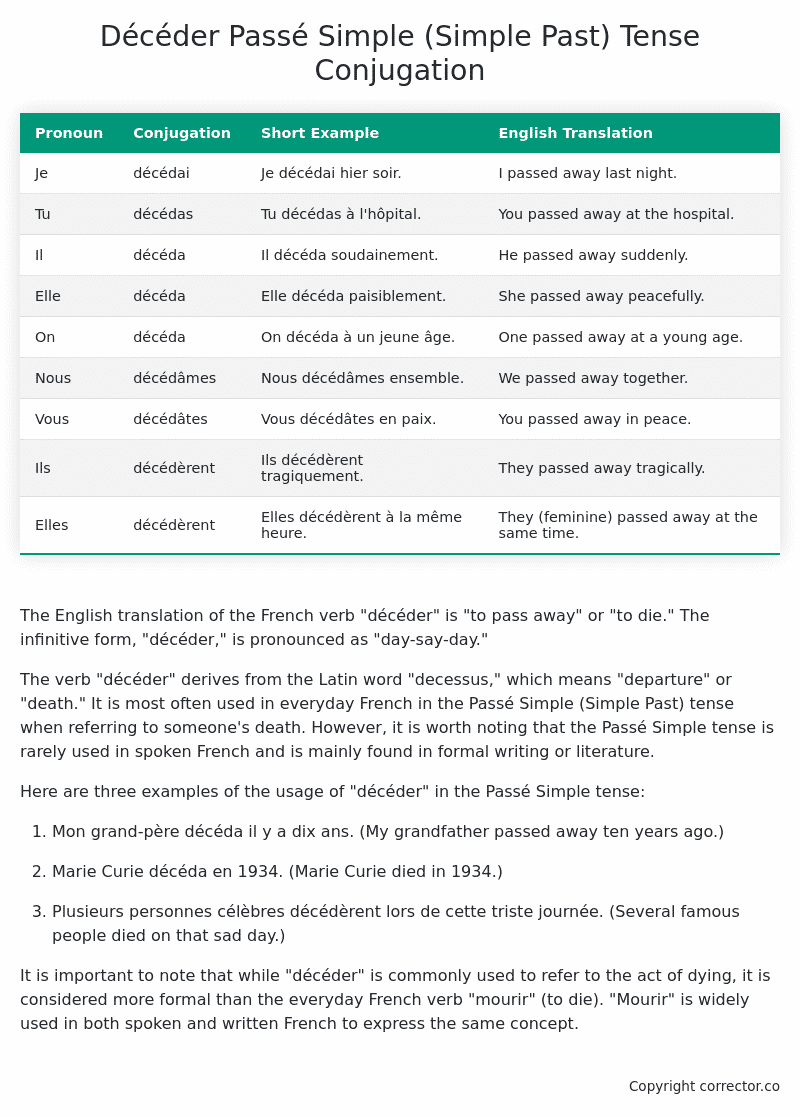Passé Simple (Simple Past) Tense Conjugation of the French Verb décéder
Introduction to the verb décéder
The English translation of the French verb “décéder” is “to pass away” or “to die.” The infinitive form, “décéder,” is pronounced as “day-say-day.”
The verb “décéder” derives from the Latin word “decessus,” which means “departure” or “death.” It is most often used in everyday French in the Passé Simple (Simple Past) tense when referring to someone’s death. However, it is worth noting that the Passé Simple tense is rarely used in spoken French and is mainly found in formal writing or literature.
Here are three examples of the usage of “décéder” in the Passé Simple tense:
-
Mon grand-père décéda il y a dix ans.
(My grandfather passed away ten years ago.) -
Marie Curie décéda en 1934.
(Marie Curie died in 1934.) -
Plusieurs personnes célèbres décédèrent lors de cette triste journée.
(Several famous people died on that sad day.)
It is important to note that while “décéder” is commonly used to refer to the act of dying, it is considered more formal than the everyday French verb “mourir” (to die). “Mourir” is widely used in both spoken and written French to express the same concept.
Table of the Passé Simple (Simple Past) Tense Conjugation of décéder
| Pronoun | Conjugation | Short Example | English Translation |
|---|---|---|---|
| Je | décédai | Je décédai hier soir. | I passed away last night. |
| Tu | décédas | Tu décédas à l’hôpital. | You passed away at the hospital. |
| Il | décéda | Il décéda soudainement. | He passed away suddenly. |
| Elle | décéda | Elle décéda paisiblement. | She passed away peacefully. |
| On | décéda | On décéda à un jeune âge. | One passed away at a young age. |
| Nous | décédâmes | Nous décédâmes ensemble. | We passed away together. |
| Vous | décédâtes | Vous décédâtes en paix. | You passed away in peace. |
| Ils | décédèrent | Ils décédèrent tragiquement. | They passed away tragically. |
| Elles | décédèrent | Elles décédèrent à la même heure. | They (feminine) passed away at the same time. |
Other Conjugations for Décéder.
Le Present (Present Tense) Conjugation of the French Verb décéder
Imparfait (Imperfect) Tense Conjugation of the French Verb décéder
Passé Simple (Simple Past) Tense Conjugation of the French Verb décéder (You’re reading it right now!)
Passé Composé (Present Perfect) Tense Conjugation of the French Verb décéder
Futur Simple (Simple Future) Tense Conjugation of the French Verb décéder
Futur Proche (Near Future) Tense Conjugation of the French Verb décéder
Plus-que-parfait (Pluperfect) Tense Conjugation of the French Verb décéder
Passé Antérieur (Past Anterior) Tense Conjugation of the French Verb décéder
Futur Antérieur (Future Anterior) Tense Conjugation of the French Verb décéder
Subjonctif Présent (Subjunctive Present) Tense Conjugation of the French Verb décéder
Subjonctif Passé (Subjunctive Past) Tense Conjugation of the French Verb décéder
Subjonctif Imparfait (Subjunctive Imperfect) Tense Conjugation of the French Verb décéder
Subjonctif Plus-que-parfait (Subjunctive Pluperfect) Tense Conjugation of the French Verb décéder
Conditionnel Présent (Conditional Present) Tense Conjugation of the French Verb décéder
Conditionnel Passé (Conditional Past) Tense Conjugation of the French Verb décéder
Conditionnel Passé II (Conditional Past II) Tense Conjugation of the French Verb décéder
L’impératif Présent (Imperative Present) Tense Conjugation of the French Verb décéder
L’impératif Passé (Imperative Past) Tense Conjugation of the French Verb décéder
L’infinitif Présent (Infinitive Present) Tense Conjugation of the French Verb décéder
L’infinitif Passé (Infinitive Past) Tense Conjugation of the French Verb décéder
Le Participe Présent (Present Participle) Tense Conjugation of the French Verb décéder
Le Participe Passé (Past Participle) Tense Conjugation of the French Verb décéder
Struggling with French verbs or the language in general? Why not use our free French Grammar Checker – no registration required!
Get a FREE Download Study Sheet of this Conjugation 🔥
Simply right click the image below, click “save image” and get your free reference for the décéder Passé Simple tense conjugation!

Décéder – About the French Passé Simple (Simple Past) Tense
Formation
Usage
Narration
Historical Context
Interactions with other tenses
Passé Composé
Imparfait
Conditional and Subjunctive
Summary
I hope you enjoyed this article on the verb décéder. Still in a learning mood? Check out another TOTALLY random French verb conjugation!


